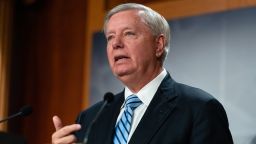A special grand jury investigating efforts by former President Donald Trump and his allies to overturn the 2020 election in Georgia is winding down its work, according to sources familiar with the matter.
The Atlanta-area special grand jury has largely finished hearing witness testimony and has already begun writing its final report, the sources said, an indication that prosecutors will soon be deciding whether to seek criminal charges and against whom.
In Georgia, special grand juries are not authorized to issue indictments. The final report serves as a mechanism for the panel to recommend whether Fulton County District Attorney Fani Willis should pursue indictments in her election interference investigation. Willis could then go to a regularly empaneled grand jury to seek indictments.
“It’s a significant step, it’s the culmination of work by prosecutors and the special grand jury. But it shouldn’t be taken as any kind of guarantee of a conviction down the road,” said Michael J. Moore, former US attorney for the Middle District of Georgia. “It’s just the beginning.”
Prosecutors had hoped to move ahead with indictments as early as December, sources previously told CNN. But court fights for testimony from high-profile witnesses, such as South Carolina Sen. Lindsey Graham, former Trump national security adviser Michael Flynn and former Trump White House chief of staff Mark Meadows – all of whom were ordered to testify before the special grand jury – have likely shifted indictments to 2023, according to a person familiar with the situation.
Willis has already informed Rudy Giuliani and 16 Republicans who served as pro-Trump fake electors in the state that they are targets of her investigation. She has also been scrutinizing Trump and other top lieutenants, including Meadows.
The next phase in the Georgia investigation comes at a politically and legally perilous time for Trump. His nascent 2024 presidential campaign is off to a sputtering start, and he is under Justice Department scrutiny both for his handling of classified government documents after leaving the White House and for his activities surrounding the January 6, 2021, attack on the US Capitol and efforts to upend the 2020 election results. Federal investigators are also scrutinizing several Trump associates who were involved in the unsuccessful effort to overturn the presidential election.
Some outside legal experts have cautioned, though, that any case against Trump would be far from a slam dunk.
When there’s a public case, “the games begin. It will be fought in the court of law and the court of public opinion,” Moore said.
If prosecutors hope to bring a successful case against Trump or his allies, they will have to prove that their activities extended well beyond the usual efforts to win an election and veered into criminal territory.
“I just think when you’re taking on a political figure like this, it’s a tougher case,” Moore said. “Every candidate wants to win, every candidate does everything they can to win, and they explore every option.”
Willis has already spent more than a year digging into Trump and his associates, kicking off her investigation in early 2021, soon after a January call became public in which Trump pressured Georgia Secretary of State Brad Raffensperger to “find” the votes necessary for Trump to win the Peach State in the presidential election.
Trump lost to Joe Biden in Georgia by nearly 12,000 votes in 2020. The former president has insisted that there was nothing problematic about his activities contesting the 2020 election in Georgia and has referred to his call with Raffensperger as a “perfect” phone call.
Willis’ investigation has long since expanded beyond the call to encompass false election fraud claims made to state lawmakers; the fake elector scheme; efforts by unauthorized individuals to access voting machines in one Georgia county; and threats and harassment against election workers.
The special grand jury – made up of 23 jurors and three alternates – was seated in May 2022, with the power to subpoena witnesses and documents and otherwise investigate the effort to subvert Georgia’s presidential election results. The panel is authorized to continue its work until May 2023, but Willis has signaled for months that she hoped to conclude the grand jury’s investigative work well before then.
A spokesman for the district attorney’s office declined to comment. A Trump spokesman did not respond to a request for comment.
CNN’s Zachary Cohen and Jason Morris contributed to this report.






